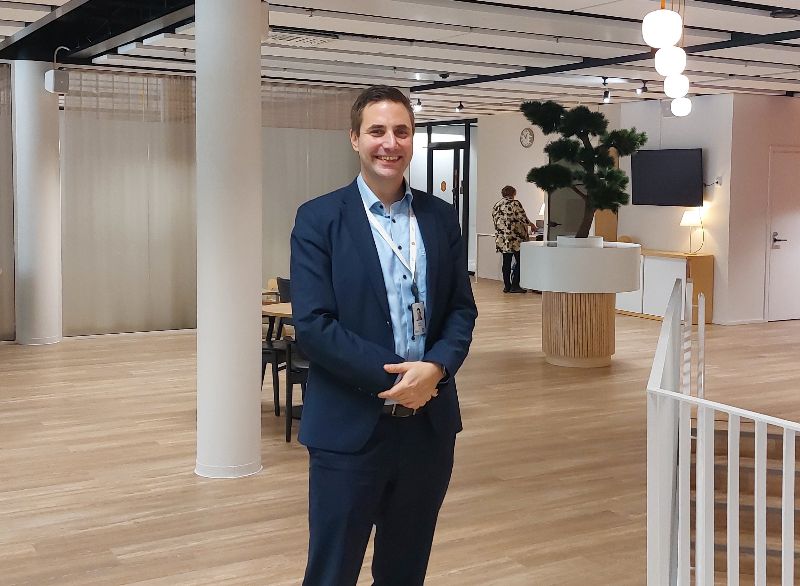Asset manager
"It is essential to get along with different people, as customer meetings are a significant part of my work. Naturally, substance competence is important, but it alone is not enough. It is also good to be genuinely interested in investing and to understand the functioning of the market."

- Mikko Särkiniemi
- Asset manager at OP Uusimaa.
- Graduated as a Master of Science in Economics and Business Administration from the University of Vaasa, with economics as his major.
- 15 years of work experience in the field.
Briefly explain what you do for a living.
I work as asset manager at the OP of Uusimaa. I prepare investment plans for private customers, as well as provide expert advice in investing and managing assets. In our bank, the asset manager is responsible for customers whose wealth and needs require high-level investment expertise. I am responsible for finding the best possible investment targets for the customer and monitoring their development. In connection with customer meetings, the customer's daily banking matters are also handled, and I direct them to other OP group experts as necessary, for example with regard to non-life insurance or legal services.
How have you ended up in the profession of your choice?
I have been interested in investing from a very young age, so work in the financial sector was a natural choice for me. At the university, I studied economics, which is slightly less common than funding and accounting in our field. I wanted a challenge, so I chose the mathematically most demanding option. Based on economics, it is easier to perceive larger entities and understand mathematical models.
Describe your typical working day or week.
My working day usually starts with an investment market overview. Together with my colleagues, we look, for example, at the events of the previous day in the US market and the reactions of central banks to the market movements. After the overview, I have one or two customer meetings, where we discuss customers’ investments. My days also include meetings and responding to customer messages.
What kind of work environment or working hours do you have?
I mostly work at the bank office, as most of the customer meetings are held face-to-face. Some of the meetings are held remotely, and I manage them either from home or from the office. My usual working day starts at about 9 a.m. and ends at 5 p.m. My working hours are determined by the office opening hours, which are between 10 a.m. and 4.30 p.m. If necessary, I also meet customers outside these hours.
What kind of competence or qualities are required in the profession?
It is essential to get along with different people, as customer meetings are a significant part of my work. Naturally, substance competence is important, but it alone is not enough. It is also good to be genuinely interested in investing and to understand the functioning of the market. This type of knowledge forms my core competence, but in-depth knowledge of these matters varies among professionals in the field.
What is the best thing about your profession?
For an asset manager, the most rewarding thing is to see a satisfied customer, whose expectations I have exceeded with my expertise and work input. Customer satisfaction is monitored at our bank on a monthly basis, and when looking at the results, I often feel good.
What are the downsides of the profession or what seems challenging?
Sometimes I have tasks that are not necessarily directly related to my core task. These tasks may take a lot of time and may be challenging to handle. Often they have not been prepared for, schedule-wise, which increases the pressure on other work. For example, a client's death may be associated with a complex death estate, the sharing of which progresses slowly. Yet, managing these types of matters is often of paramount importance to the client, so the asset manager must also master such processes.
What would you tell a person considering the profession of a asset manager?
Personal interest in investing helps in the work of an asset manager. Even if you only invest small amounts, monitoring the development of one's own investments is the best way to get to grips with the functioning of the financial markets. Studies in the field are also much more interesting, when you have your own money on the line.
Although today there is a lot of information on investing, for example in the form of books and podcasts, it is good to be aware that the sector is conservative. Without certain qualifications, it is almost impossible to advance in your career.
How do you see the future of your profession?
I believe that there will be plenty of work in this field in the future, as the wealth of Finns is constantly growing and wealth is being transferred to new generations. The management of large assets is often outsourced or at least an expert opinion is asked to support decisions. Services related to investment activities are profitable business for banks, so the future also looks bright from that aspect.
However, banks need to closely monitor changes caused by technological developments. There is also an increase in self-direction in people's investment behaviour, and we are increasingly offering different alternatives to our customers. These customers also often want to discuss issues, such as the development of individual companies or market phenomena, with a professional.
